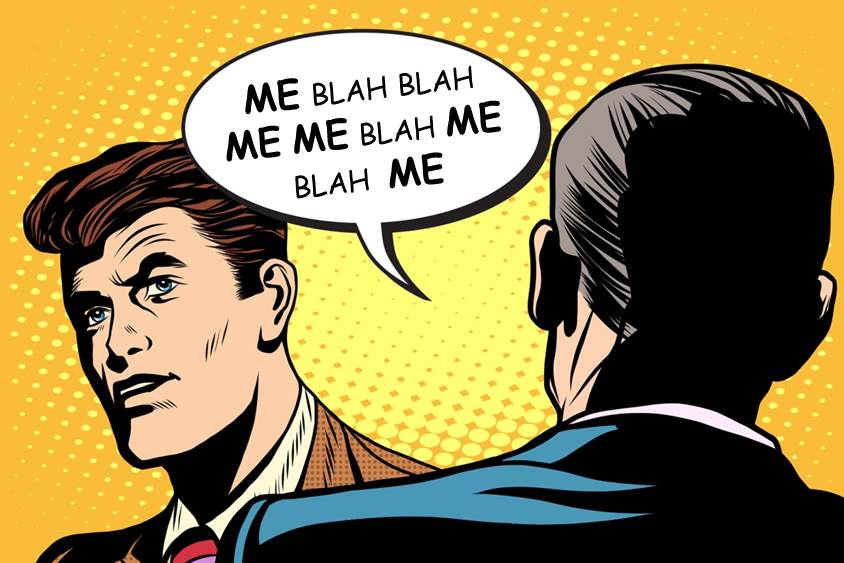
Great conversations, remember them? You ask, I answer. I ask, you answer. You talk, I listen. I talk, you listen. Backwards and forwards in perfect rhythm, like a gentle game of tennis on a Sunday afternoon.
Swopping juicy gossip, having a moan about the boss, catching up on the doings of family and mutual friends.
How quickly the time flew by and what a relief it was to have someone who really wanted to listen if you had problems to share or stories to tell. And didn’t it make you feel so valued when someone asked for your advice and later called to tell you how well it had worked.
Has social media killed our conversations?
Many social commentators believe it has. However, they cite the obvious and widespread problem of people having face-to-face conversations and leaving their smart phones switched on.
This is unspeakably rude. It signals that a message or a call may arrive at any second that’s more interesting or important to the other person than anything you have to say.
Talking to someone who cannot hold eye contact because they have to keep checking their phone is worse than talking to yourself.
But maybe social media is killing conversations in another way too
Suddenly everyone is a broadcaster. Announcing holiday plans, mourning the loss of a pet, sharing photographs of their lunch – the most trivial event is deemed important enough to announce to the world. Look at me, we shout, I’m lucky, I’m fascinating, I’m grieving, I’m eating a hamburger.
We are being swept away on a riptide of self-promoting irrelevance. So is it any wonder that people are now more interested in talking about themselves than in hearing about you?
In an article in the Financial Times, Robert Shrimsley told a story about attending a social function with his wife. A fairly dominant woman began talking about herself and, almost in passing, mentioned that someone they all knew had died suddenly.
“I was in the shopping centre when I heard and I couldn’t believe it,” she gushed, “I went into shock. I couldn’t speak for 10 minutes” But how did she die? She waved the question away. “Seriously, I was depressed for about a week.”
The poor dead friend was not the tragic subject of these events but the storyteller herself.
How to recover the gentle art of conversation
- If you’re talking face-to-face, switch off your cell phone unless you really are expecting an urgent call.
- Pause from time to time to see if anyone has a question.
- Practice your listening kills. You’ll be surprised how interesting some people can be when you give them the freedom to talk without interruptions.
- Be conscious of how long you talk about yourself without asking others to speak. Unless you’re revealing some complex, ground-breaking new idea, you shouldn’t need more than a couple of minutes to make your point. Any longer and it’s a lecture, not a conversation.
- If you’re aware you’ve been hogging the spotlight, apologize immediately and hand over to someone else.
What can you do about someone who thinks it’s only about them?
- Your first option is to grin and bear it. But that’s just ignoring the problem, not fixing it.
- Start a phone conversation by saying you have limited time – you have to leave for an appointment in, say, 10 minutes and you have some important things you’d like to discuss.
- Before the conversation begins, say “I enjoyed our last chat but there wasn’t time for me to ask the questions/make the points I wanted. Can I go first?”
- Learn from top TV and radio interviewers. When faced with a rambling interviewee, they simply interrupt with phrases like: I think you made that point already/ Can I just say this/Sorry to butt in/Can I stop you there/Which goes to show that/This brings us to another subject and so on.
- Always be honest. If friends, family or colleagues simply don’t take the hints you’re dropping, be kind but be direct: “Laura, you’re a wonderful person and it’s always good to chat to you. But lately I feel it’s become a little one-sided. Let’s have a conversation where we participate equally, I’ve got so much to tell you.”
Straight talking carries a risk, of course, in this modern age where people only want to listen to like-minded individuals. There’s a chance you may upset someone by being frank.
But surely it’s better than having to tolerate their rudeness and insensitivity?
There are a couple of ways to find out how good you are at conversations. One, the easiest, is to ask a few trusted friends or colleagues. The only drawback is that so many people are offended by honesty they may not feel comfortable telling you if they thing you need to improve.
If you’re brave enough, record a couple of longish conversations on your phone or face to face. Very important: always ask the other parties for permissions first and explain why you want a record of the conversation. If anyone objects, respect their wishes.
If you liked, then please subscribe to our YouTube Channel for video content. You can also find us on Twitter, Facebook, Instagram and Linkedin.




